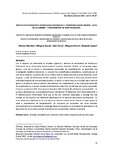| dc.rights.license | http://creativecommons.org/licenses/by-nc-sa/3.0/ve/ | |
| dc.contributor.author | Montilva, Mariela | |
| dc.contributor.author | García, Milagros | |
| dc.contributor.author | Torres, Aida | |
| dc.contributor.author | Puerta, Milagros | |
| dc.contributor.author | Zapata, Elizabeth | |
| dc.date.accessioned | 2015-03-12T21:55:27Z | |
| dc.date.available | 2015-03-12T21:55:27Z | |
| dc.date.issued | 2015-03 | |
| dc.identifier.issn | 2244-7482 | |
| dc.identifier.uri | http://www.saber.ula.ve/handle/123456789/39972 | |
| dc.description.abstract | Con el objetivo de determinar la empatía cognitiva y afectivade estudiantes de Medicina y Enfermería de la Universidad Centroccidental Lisandro Alvarado (UCLA), en Venezuela, según género, nivel de la carrera y antecedentes personales de hospitalización, se desarrolló una investigación analítica transversal. La muestra fue estratificada probabilística, constituida por el 50% de los alumnos cursantes del inicio, mitad y final de ambas carreras (223 de Medicina, 78.8% mujeres, y 140 de Enfermería, 89.2% mujeres). Previa información y firma del consentimiento informado después de una actividad docente, se aplicó un instrumento que recogió datos sobre el género y la edad de cada estudiante, antecedentes de hospitalización, y las respuestas obtenidas de la aplicación de la escala Interpersonal Reactivity Index (IRI), constituido por cuatro subescalas: Toma de perspectiva (TP), Preocupación Empática (PE), Fantasía (F) y Malestar personal(MP). Los puntajes obtenidos por los estudiantes fueron más altos en TP (Medicina: 19,6, Enfermería 19,5) y PE (Medicina: 20.3, Enfermería: 20.1) que en las dos restantes subescalas; el puntaje fue más elevado en las mujeres, con diferencia significativa en TP para las estudiantes de Medicina. No hubo diferencias significativas del puntaje en los diversos niveles de las carreras ni según grupo de edad o antecedentes de hospitalización. Se comparan los resultados con otros estudios, concluyéndose en la necesidad de investigar factores presentes en el contexto de aprendizaje y de tipo personal, de lo cual se deriven intervenciones que permitan mejorar la empatía. | es_VE |
| dc.language.iso | es | es_VE |
| dc.publisher | SABER-ULA | es_VE |
| dc.rights | info:eu-repo/semantics/openAccess | |
| dc.subject | Empatía | es_VE |
| dc.subject | Estudiantes de medicina y enfermería | es_VE |
| dc.title | Empatia en estudiantes venezolanos de medicina y enfermeria según género, nivel de la carrera y antecedentes de hospitalizacion. | es_VE |
| dc.title.alternative | Empathy in venezuelan students of medicine and nursing by gender, level of study and background of hospital. | es_VE |
| dc.title.alternative | Empatia em estudantes venezuelanos em medicina e enfermagem por sexo, nível de estudo e antecedentes de hospital. | es_VE |
| dc.type | info:eu-repo/semantics/article | |
| dc.description.abstract1 | With the aim of determining Medicine and nursery students' cognitive and affective empathy of Lisandro Alvarado University (UCLA), Venezuela, according to gender and career level, a analytic cross-sectional research was carried out. The sample was randomly stratified, constituted by 50 % of students belonging to beginning, half and end of both careers (223 Medicine students, 78.8% women, and 140 Nursery students, 89.2% women). Firstly, information was presented and signature of the informed consent was handed after an educational activity, an instrument was applied. It gathered data about gender and age of each student, hospitalization backgrounds, and answers obtained out of the application of Interpersonal Reactivity the Index scale (IRI), constituted by four subscales: perspective taking (PT), Empathic Worry (EW), Fantasy (F) and Personal Discomfort (PD). Scores obtained by students were higher in TP (Medicine: 19.6, Infirmary 19.5) and EW (Medicine:20.3, Nursery: 20.1) than in the remaining subscales; the score was higher in women, with a significant difference in TP in Medicine students. There were neither significant differences of scores in careers levels nor in group of age nor hospitalization backgrounds. Results are compared to other studies, concluding the need to research present factors in learning context and personal type, from which interventions originate allowing empathy improvement. | es_VE |
| dc.description.colacion | 44-67 | es_VE |
| dc.description.email | marielamontilva@gmail.com | es_VE |
| dc.description.frecuencia | semestral | |
| dc.identifier.depositolegal | ppi200802ME3759 | |
| dc.publisher.pais | Venezuela | es_VE |
| dc.subject.facultad | Facultad de Medicina | es_VE |
| dc.subject.institucion | Universidad de Los Andes | es_VE |
| dc.subject.keywords | Empathy | es_VE |
| dc.subject.keywords | Medicine and nursery students | es_VE |
| dc.subject.keywords | Interpersonal reactivity index | es_VE |
| dc.subject.publicacionelectronica | Revista de Bioética Latinoamericana | |
| dc.subject.seccion | Revista de Bioética Latinoamericana: Artículos | es_VE |
| dc.subject.thematiccategory | Medicina y Salud | es_VE |
| dc.subject.tipo | Revistas | es_VE |
| dc.type.media | Texto | es_VE |


